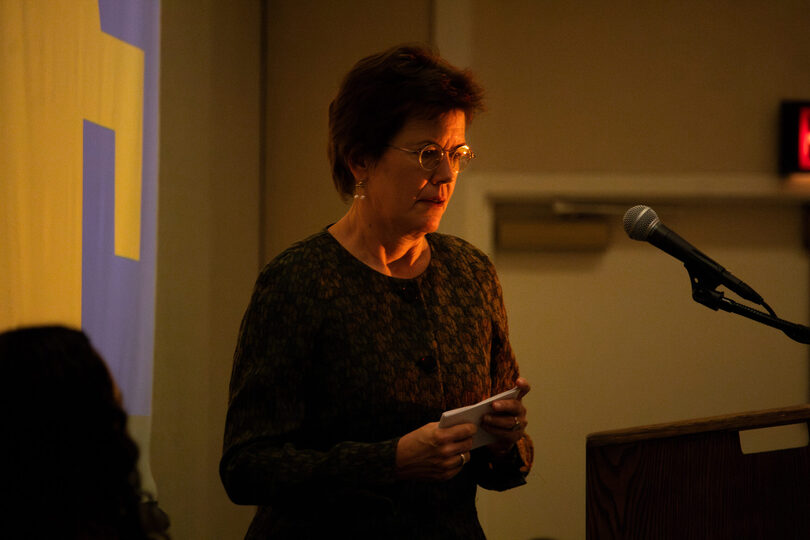Ritter said SU working with colleges, universities to discuss swatting protocol

Cassandra Roshu | Photo Editor
There have been three false reports of incidents targeting Maxwell and Eggers Halls this semester.
Get the latest Syracuse news delivered right to your inbox.
Subscribe to our newsletter here.
Provost Gretchen Ritter provided an update on the university’s response to recent swatting incidents targeting the Maxwell School of Citizenship and Public Affairs during Wednesday’s University Senate meeting.
Ritter said that the Department of Public Safety is working with local and federal law enforcement to find who is responsible for Friday’s false bomb threat. DPS has also connected with local colleges, universities and hospitals to discuss protocols for swatting — which she called a “hoax report of a serious criminal incident” — and to guide the university’s response moving forward, she said.
“Thanks to some productive conversations with DPS and other campus stakeholders, this week the university is reviewing and appropriately revising our protocols to align with best practices in law enforcement and communications,” Ritter said.
This semester, there have been three false reports of incidents targeting Maxwell and Eggers Halls: false active shooter threats on Feb. 11 and 12 and a false bomb threat Friday.
At the meeting, the Senate also passed a resolution to merge or rename multiple committees as part of its ongoing “committee reimagining” process. The Agenda Committee discussed expanding its own committee with hopes of adding three more senators and filling all of its remaining student and staff positions.
Following the Agenda Committee’s proposal to expand the committee, meeting attendees raised concerns about the representation of students and university staff within the Senate. They suggested changes to eliminate Senate bylaws that make it “harder” for the Senate to fill its seats. Samuel Gorovitz, a senator on the Academic Affairs Committee, proposed removing the requirement that senators cannot run for a seat unopposed.
“The staff don’t have quite as much discretion over their time (as faculty),” Gorovitz said. “It might be easier to interest staff (in the Senate) if it were a matter of university policy that the supervisors of staff were required to let staff participate and count that during their work time.”
Agenda Committee Chair Kira Reed confirmed that the Student Life and Athletic Policy Committees will not merge — an idea discussed in the Senate’s open forum earlier this month — following conversations between the two committees which determined there is no “clear overlap” between the committee’s responsibilities.
The Student Life Committee, however, is undergoing an update as part of the committee reimagining process. A tentative new name, “The Student Thriving, Engagement, and Resources Committee,” is part of an effort to better report on different student groups and “not treat students as a monolith,” Reed said.
The Race, Ethnicity, Equity, and Inclusion Committee and the Lesbian, Gay, Bisexual, Transgender, Queer, and Asexual Justice and Advocacy Committee will also merge as the “Intersectional Equity for Race, Ethnicity, Sexuality, Gender Identity, and Disability Committee” following the earlier resolution, according to the Senate’s slideshow.
Some of the Race, Ethnicity, Equity, and Inclusion Committee’s work so far this semester included hosting conversations around the Students for Fair Admissions Inc. v. President & Fellows of Harvard College Supreme Court decision, the renaming of 119 Euclid to “The Barner-McDuffie House” and making members aware of informational sessions regarding the ongoing Israel-Hamas war, said Suzette Meléndez, a senator in the committee.
“We continue to address these challenging topics and how they manifest in our classrooms and across our campus,” Meléndez said.
PJ DiPietro, a senator in the LGBTQA Justice and Advocacy Committee, said merging the two committees will help bring an “intersectional approach to equity.”
Reed later said that the Agenda Committee intends to vote on a motion for the Women’s Concerns Committee to join the newly merged committee in its March meeting.
At the end of the meeting, the Senate held an “executive session,” which only senators can attend, for the previously re-scheduled Honorary Degree Committee report. The Academic Affairs, Curricula, Honorary Degrees and Student Life committees are on the agenda for the Senate’s next meeting on March 20.





